Manhattan hotshot journo Lewis Beale is the latest smart guy to allow his personal feelings to get in the way of acknowledging the malignant greatness of There Will Be Blood. In his not-yet-posted Film Journal review he admits it’s “a major work from an extremely talented director that’s been “meticulously made and contains some astonishing set pieces,” and another one of Daniel Day-Lewis‘s “astonishing, burrowing-into-the-role performances.” But it “centers on a pretty reprehensible human being whose actions become less sympathetic, and more bizarre, as the story unfolds.” Beale calls it “a flawed, at times distasteful piece that will turn off as many viewers as it turns on. Is it art? Undoubtedly. Commercial? Probably not.”
wired
Gyllenhaal vs. Namath
Michael Fleming‘s Variety story about Jake Gyllenhaal agreeing to play famed quarterback Joe Namath put me to sleep when I read it two days ago. The fact that Namath was “the first football player to find rock-star status” means zip in terms of a strong story ingredient. I remember Namath and the reports about his big-star swagger — fame, girls, money, endorsements. But nothing happened in his life that would make for strong drama.
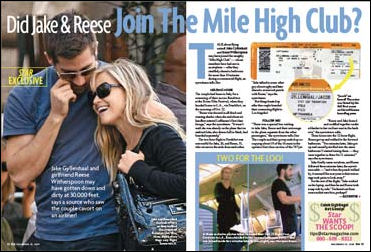
The most exciting thing that happened in Namath’s life was beating the Colts in the ’69 Super Bowl. But a win has to be more than just a win. It has to mean something above and beyond.
It is slightly more interesting, frankly, to read about the alleged mile-high incident between Gyllenhaal and Reese Witherspoon on their way back from Europe two or three weeks ago. They spent a reported 11 minutes in the first-class bathroom. I would rather see a short film about this than a feature about Broadway Joe any day.
There’s going a huge hair problem with the Namath film, by the way. For a film set in the ’60s and ’70s, Gyllenhaal will be obliged to wear something similar to an Anton Chigurh haircut. Think about that for a second.
Nichols film vs. Sorkin’s script
After seeing Charlie Wilson’s War last Monday night I wrote that I liked it, and I meant that. I said “there is edge and attitude in this Mike Nichols film — certainly irony upon irony. And it does stay with you.” I also said that if you can “kick back, chill down and enjoy what’s awfully well-crafted and efficient about it (which isn’t hard), you’ll be fine with it too.”
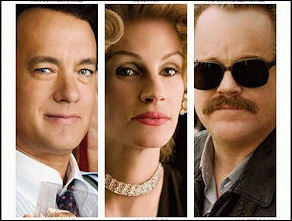
But the honest fact is that I like Aaron Sorkin‘s 5.25.05 version of his Charlie Wilson’s War script somewhat more.
I don’t know how much of Sorkin’s script Nichols actually shot, but it’s been said that Nichols cut, re-cut and then re-cut some more, and then did some extra shooting. Nichols’ game plan, in any case, seems to have been to water down the explicit political references and generally play up the charm and the heroism (while toning down the irresponsible boozing) of Tom Hanks‘ Charlie Wilson character.
The final version of Charlie Wilson’s War runs 97 minutes with credits, and Sorkin’s ’05 script runs 145 pages. Based on the page content, it’s obvious that the movie has been shaped in order to be less complex, much more upbeat and explicitly depoliticized, which to say scrubbed clean of all specific Al Qeada and 9.11 mentions.
If each scene in Sorkin’s 145-page script had been shot, the film would have at least run a solid two hours, or roughly 20 to 25 minutes longer. (Nichols shot the film at a fast pace, like a comedy, so figure less than a minute a page.) The finished film tells the same basic story, but it contains only about 70% of the material that Sorkin put to page.
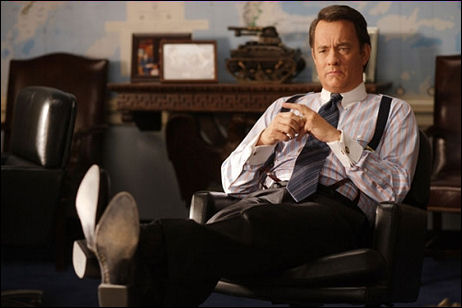
The script reminds you that Sorkin is a fine screenwriter and a seasoned pro — he knows how to make a script tight and fat-free and tell a good story. And I just feel that what he wrote two and a half years ago is a denser, darker and more explicit thing than the film. I’m not putting Nichols’ movie down — it’s fine for what it is. I just wish he’d used more of Sorkin’s material.
I also wish Nichols hadn’t tried so hard to make Wilson, a real-life Texas Congressman who in the late ’80s almost single-handedly arranged to supply the Afghanistan Muhjadeen with arms that led to the defeat of the Russian invaders, into such a red-white-and-blue hero.
The movie begins and ends with Hanks being given an award for his valiant efforts along these lines, and I have to say that this scene feels over-sold, as if there was a determination to make sure the audience understands that Charlie Wilson’s War is an “up” movie about a true American patriot, which it mainly is. It just seems as if this was done to make sure audiences wouldn’t interpret the film as another left-liberal downer movie about the negative effects of American intervention in the Middle East.
Nichols and the producers were, I’m sure, particularly afraid of saying too explicitly that in helping the Muhjadeen we might have helped stir the pot and sew the seeds that led to the 9.11 disaster. Too dark, muddled and accusatory — better to serve up an amiable patriotic comedy that won’t alienate the moviegoers who’ve been avoiding Middle East flicks like the plague over the last couple of months.
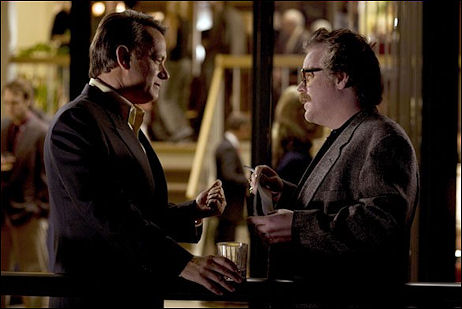
There’s no “congratulations, Charlie!” scene at the beginning and end of Sorkin’s script, for one thing. And while Nichols ignores it, Sorkin depicts a drunken hit-and-run accident that Wilson actually got into in Washington, D.C., right before a second visit to Afghanistan refugee camps. (In the film the trip happens in order to persuade Ned Beatty‘s white-haired U.S. Senator character, Doc Long, to vote for funding the arms shipments.)
In a briefing scene on page 107 attended by Wilson and Phillip Seymour Hoffman‘s Gust Avrakatos, a “briefer” makes an explicit reference to an anti-Soviet fighting group in Afghanistan “that we like… funded by a wealthy Saudi aristocrat. They call themselves The Base, which translates in Arabic to Al Qeada.” I’ve only seen the film once, but I don’t remember hearing this line in Nichols’ film.
And there’s a longer version of the scene between Hanks and Hoffman on the balcony when Gust reviews the possible blowback consequences of having shown a bunch of undeducated, “off-the-charts stupid” people who don’t get the New York Times delivered to their doorstep (and therefore won’t, he predicts, understand down the road that we helped them kick the Russians out of Afghanistan) how to take on a super-power.
Nichols’ film doesn’t ignore the after-effects of our Afghanistan intervention. The film says that in the end “we fucked up the end game.” It just plays down the specific 9.11 echoes.
At the very end of Sorkin’s script there’s a three-page epilogue that takes place in Charlie’s D.C. apartment on the morning of 9.11.01 — a scene absent in Nichols’ movie. We can tell that it’s several years later by Charlie looking grayer, being married and talking about being sober. He’s pouring coffee as he talks to his off-screen wife when the building is rocked by a loud boom. Charlie goes out on the balcony and sees that the Pentagon is burning. The phone rings and his wife picks up. She tells Charlie, “It’s Gust…he says to turn on the TV.”
Halbfinger on Sundance ’08
In his 11.29 article about the ’08 Sundance Film Festival, N.Y. Times reporter David Halbfinger quotes festival honcho Geoffrey Gilmore as saying that more than half of the 2008 lineup emerged “from the pile.” The term “pile” is usually accompanied by the adjective “slush,” and taken together they mean films that have been submitted by unconnected nobodies. Or, as Halbfinger writes, “without the benefit of advance buzz from the festival’s network of talent and sales agents, established filmmakers and other scouts.”

“Blood” trailer all alone
The Paramount Vantage guys finally straightened out the embedded code for that new There Will be Blood trailer — the best of the bunch — without the other PV trailers looping in.
Trade reviews of “Charlie”
Two positive trade reviews for Charlie Wilson’s War went up today. Variety‘s Todd McCarthy called it “a smart, sophisticated entertainment for grownups…snappy, amusing and ruefully ironic.” And the Hollywood Reporter‘s Kirk Honeycutt said…well, it’s hard to find a tight summation of opinion, but he notes that this “outrageous tale of 1980s-era good corruption, apparently largely true and all the more outrageous for that, might be the perfect antidote to today’s shrill political scene with Republicans and Democrats staking out intractable positions and accomplishing little.”
Leicht on “No Country”
Another thoughtful letter about No Country for Old Men came in today, this one from HE reader Matthew Leicht. “I saw it yesterday, and it kind of shook me in a way that no movie has in recent memory,” he begins. “For the most part, there seems to be a debate over various scenes in the film and why they’re there, blah blah, but my thumbnail view is that this is a movie about principles and morals.
“Anton Chigurh is dismissed as a psycho by almost everyone in the film, but he explains in three different scenes (gas station, Carson Wells, Carla Jean) that he has a principle, and that he sees life as a fleeting occurance as opposed to some epic drama. He reduces life and death to a coin flip, which is masterfully played on with the random car accident that closes the film. Ed Tom Bell wants to make sense of life, Llewelyn wants to move forward…every character displays a certain moral compass. And this gradually led to a realization that felt like an avalanche.
“Ever since I began watching AMC’s Mad Men Ive been thinking more and more about our culture and if we are headed toward some kind of endgame. If you think about it, 1960 (when Mad Men is set) became a line of demarcation. The manipulation of the advertising world is a perfect backdrop for this. The industrial age had peaked and was beginning to recede. Americans were no longer suffering to get by. The Depression era was only a story told by grandparents, the struggle was over so we began to consume and were told that this is progress, that accumulation was the process by which to meet our goals.
“But as the material value began to rise in this country, the value and quality of human life seemed to decline. That’s an impression or appearance, at least, through the prism of a country without direction. And No Country for Old Men has had such an impact on me because it sums up the whole notion of humanity and the place in society we all hold.
“Anton will stop at nothing to get what he needs to get (or was commissioned to get). He justifies his actions by reducing life to something that just happens. There is no mystery, there is no catch. When he said to Carson something to the effect of ‘if the rule you live by got you to this point, what good is the rule?,’ the whole movie started to come together.
“Also at that point, the violence begins to subside (other than the driver of the truck that Moss gets into). We see Carson get shot from the reverse angle; Moss is killed off-screen (and we barely see the body), Carla Jean is killed and we don’t even know how. Hell, Anton may even succumb to his injuries. it becomes clearer and clearer that the dying is less significant, and it’s the living that matters.
“Ed Tom is such a significant character because he represents someone who doesn’t get involved, even though he could have prevented a lot of the killing. He doesn’t get involved because he can’t understand such behavior. He feels a level of disconnect from what is going on and to get involved would be almost like admitting defeat.
“I haven’t entertained a lot of the ideas brought up by some of your readers (a missing conversation between Anton and Ed Tom, the true nature of Carson, if Carla Jean was really killed, who was in the station wagon that hit Anton), mainly because they all feel a little bit like conspiracy theories. Kind of peripheral if you ask me because this movie delivers a very heavy pronouncement on the human condition, and it’s all on the screen. It’s been so long since a film had any real impact upon me, and I had to let you know.”
“Walk Hard” a year-end antidote
“I can’t tell you much about last night’s [Manhattan] screening of Walk Hard— there’s a review embargo for a few more weeks– but I will tell you this: I haven’t heard an audience laughing so hard since Superbad,” writes Screener‘s Katey Rich. “Coming after a long fall of grim (but often great) movies, Walk Hard is the perfect holiday season antidote for grownups, riotously silly but well-made, a thumb to the nose at the pretension and preening that often takes the screen this time of year.”
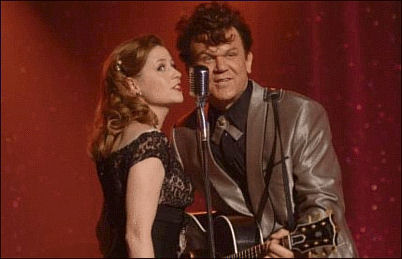
Karger pulling for “Clayton”
At last night’s Gotham Awards, Entertainment Weekly‘s Dave Karger confessed to The Envelope‘s Tom O’Neil that Michael Clayton is his favorite pet pony in the Best Picture race. And that strategy-wise, he sees Atonement and No Country for Old Men as the likeliest contenders.
No more Queen Latifah
A statement of general policy, effective now and locked for the indefinite future: I hereby refuse to see any movie starring Queen Latifah, and I’m going to really and truly think twice about any film in which she plays a supporting role. As far as I’m concerned every film she’s in carries the Mummy’s curse, and that includes the mostly insipid Hairspray.
Q.L.’s track record is worse than Cuba Gooding‘s even, and that’s saying something. The Perfect Holiday, Life Support, Stranger Than Fiction, Last Holiday, Beauty Shop, Barbershop 2: Back in Business, Chicago, etc. No reflection on her person or personality. She may be a great and generous human being, but her taste in movies seems to be primarily based on the concept of getting paid.
Wried passes along same rumor
A Wired/Underwired blogger named John Scott Lewinski said today that two sources (a working movie producer, the other a show-runner on an upcoming sci-fi pilot) have told him that the WGA strike is set for a 12.8 settlement, which is pretty close to what I heard last weekend about the strike settlement to be announced sometime close to Pearl Harbor day (i.e., Thursday, 12.7).
The bad news, he admits, is that he might be passing along “a rapidly spreading rumor that might be, in fact, a rapidly spreading rumor. Both of my sources refused to go on the record because the date is not official and they don’t want to appear stupid if the dispute wraps before or well after that date.” Throwing caution to the wind, Lewsinki writes that “when the strike ends on Dec. 8, I reported it here first.” Nope — you actually read it here first. On Saturday, 11.24. Not that it means anything.
Sundance ’08 lineup
Right off the top and without thinking too much, here are some gut-response standouts among the 2008 Sundance Film Festival selections. The dramatic competition, world cinema, world cinema docs and domestic docs were posted at 1 pm today by Variety‘s Todd McCarthy. Premiere selections will be released tomorrow.
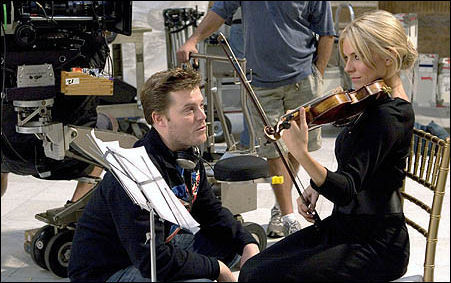
Rawson Marshall Thurber, Sienna Miller on the set of The Mysteries of Pittsburgh.
As usual, one looks for catchy or provocative subject matter, a proven director, veteran actors…anything that pops through among the Sundance grim-itude. You certainly need to be on the lookout for any film that appears to use chronic downerism as a badge of artistic sincerity or authority. Road movies, marginal lifestyles, bizarre dysfunctional behavior, warring family units, shattered dreams, sex with the wrong people for the wrong reasons, etc. Sundance spelled backwards = funky depression.
Geoff Haley‘s The Last Word, an “irreverent romantic comedy centering on a reclusive writer-for-hire of suicide notes,” sounds like a downer case in point. Winona Ryder, Wes Bentley and Ray Romano costar in this ThinkFilm release…yipes!
Any movie costarring the free-spirited Sam Rockwell needs to be approached with caution, I feel. I’m just saying “watch it”…nothing more. The film in question is Clark Gregg‘s Choke — a “raw mother-son comedy with Rockwell, Anjelica Huston and Kelly Macdonald, based on a novel by Chuck Palahniuk (Fight Club).
The Mysteries of Pittsburgh, directed and written by Rawson Marshall Thurber (Dodgeball) and starring Jon Foster, Peter Sarsgaard, Sienna Miller, Mena Suvari and Nick Nolte, sounds decent. I say this having read the book by Michael Chabon, which is about sexual exploration (a euphemism for anything gay) and a “tense” father-son relationship. Beware of any director who uses three names as it connotes pretentiousness.
Daniel Barnz‘s Phoebe in Wonderland, an “unusual coming-of-age tale” about a girl (Elle Fanning) who takes her dysfunctional family (some of whom may be played by Felicity Huffman, Patricia Clarkson, Bill Pullman and Campbell Scott) on an unexpected journey…God, another road movie?
A promising contender appears to be Christine Jeffs‘ Sunshine Cleaning, about a biohazard removal and crime-scene cleanup business with Amy Adams, Emily Blunt, Steve Zahn, Alan Arkin, Amy Redford and Clifton Collins Jr.
A sense of uncertainty pervades the synopsis of Jonathan Levine‘s The Wackness — great title! — about a teen drug dealer (Josh Peck) who falls for the daughter of his drug-taking shrink (Ben Kingsley). With Famke Janssen, Olivia Thirlby, Mary Kate Olsen and Method Man.
Among the docs, the social realism standout appears to be Nanette Burstein‘s American Teen, an “irreverent, frank account of four Indiana high school seniors.” It seems general enough in its subject and focus to have possibly lucked into something.
A celebrity portrait doc seemingly guaranteed to deliver a funny, stimulating time is Alex Gibney‘s Gonzo: The Life and Work of Dr. Hunter S. Thompson, a “look at the late author’s prime period of 1965-75 via previously unavailable homemovies, audio recordings and unpublished manuscripts.
Ditto Steven Sebring‘s Patti Smith: Dream of Life (please include footage of Smith reciting “Piss Factory”) and Marina Zenovich‘s Roman Polanski: Wanted and Desired.
Which doc will win the Al Gore award for best illuminating a dwindling resource/global contamination issue? Will it be Josh Tickell‘s Fields of Fuel, about a man who takes on “big oil, big government and big soy” as he proselytizes for energy alternatives, or Irena Salina‘s Flow: For Love of Water, about “the possibility that Earth’s supply of this essential liquid is dwindling.”
Docs about terrible histories and present-tense roblems in foreign countries include Lisa F. Jackson‘s The Greatest Silence: Rape in the Congo and Ellen Kuras and Thavisouk Phrasavath‘s Nerakhoon.
The hottest world cinema entry looks to be Jose Padhilla‘s Elite Squad, a Braizlian rime drama that’s been snapped up by the Weinstein Co. — about on a special crime unit’s war against drug dealers in the run-up to the Pope’s visit to Rio. Running a close second is Carlos Moreno‘s Perro Come Perro (Dog Eat Dog), a crime drama about “two hoods who sign their own death warrants when they bungle a job.”
A mildly interesting world doc appears to be Chris Waitt‘s A Complete History of My Sexual Failures, in which the filmmaker “consults the women in his life, past and present, to learn exactly how the opposite sex views him.” In other words, a documentary version of Neil Labute‘s Some Girls witha little Sherman’s March thrown in.
